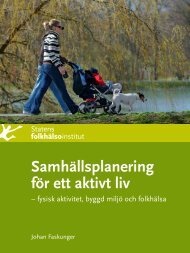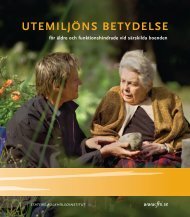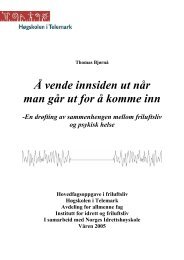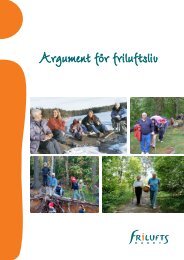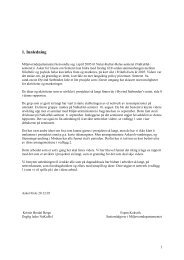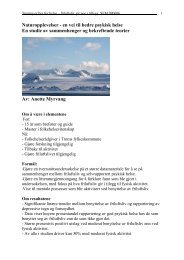Green Care: A Conceptual Framework - Frisk i naturen
Green Care: A Conceptual Framework - Frisk i naturen
Green Care: A Conceptual Framework - Frisk i naturen
You also want an ePaper? Increase the reach of your titles
YUMPU automatically turns print PDFs into web optimized ePapers that Google loves.
“An advanced industrial society is sick-making because<br />
it disables people from coping with their environment and,<br />
when they break down, it substitutes a clinical prosthesis for<br />
the broken relationships. People would rebel against such<br />
an environment if medicine did not explain their biological<br />
disorientation as a defect in their health, rather than as a<br />
defect in the way of life which is imposed on them or which<br />
they impose upon themselves.” (Illich, 1975, p. 169)<br />
In summary, many now see the practice of mental health as having<br />
become technical, sterile, mass produced, with excessive use of unnatural<br />
chemicals, isolated from its wider context, and shallow in terms of meaning<br />
and experience. The parallel quick fix in agriculture was the introduction<br />
of pesticides, insecticides and fertilisers in the second half of the twentieth<br />
century. There is now an appreciation that these “modern methods” are<br />
somewhat limited in their ability to solve complex problems.<br />
Although a strict evidence based biomedical approach works well for<br />
conditions such as infections or chemotherapy treatment of cancers, it is<br />
not possible to apply it meaningfully to the complex individual experiences<br />
which are seen in the majority of ‘mental disorder’. Many conditions are<br />
as much a lifelong and maladaptive way of being in the world as they are<br />
an ‘illness’; many people suffer painful and chaotic lives, troublesome<br />
relationships and multiple psychosocial problems. These are not amenable<br />
to simple solutions using a technological model, and in 2004 the UK<br />
Department of Health funded 11 different service models to deliver new<br />
ways of working with those who have these problems, and to evaluate their<br />
work. Many of them are strongly influenced by the ‘service user movement’<br />
and the ‘recovery model’: the intention is to help people with the discovery<br />
of their innate potential, with habilitation so they can achieve a life that<br />
they feel is worth living.<br />
In the same way as medical industrialisation is unhelpful for people with<br />
problems of this nature, the physical environment of hospitals, with their<br />
sterile hard surfaces, harsh lighting and decor, and extremely hectic activity,<br />
is not ideal. Many intensive treatment programmes would benefit by<br />
having a base in more conducive environments, such as farms and other<br />
natural settings, and include farming activities as part of their programme.<br />
The farms would have the advantage of this being a way of using their<br />
resources in a socially beneficial way, and to have a certain amount of<br />
117




